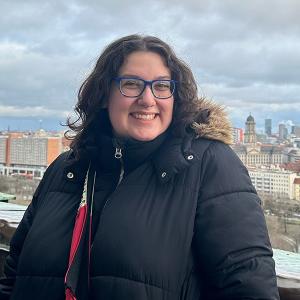It all started with a little scribble of my name onto the "secondary organ lessons" sign-up, then a short piano audition, and then a form, all filled out, signed, and handed to the conservatory dean back in August. Following that was the waiting: waiting and checking and waiting and checking Presto until a full day and a half-later when I had finally gotten consent to take secondary organ lessons. The moment that happened, I rushed to the admissions office to get my practice room key. I already had my organ textbook ready in hand.
So we've established that I was excited. As I entered the office and introduced myself, asking for an organ practice room key, I was told, "They haven't sent me a list of names for who has permission to get a practice room key."
Wait, what?
I had been waiting for days just to get access to an organ practice room: to just be able to touch this instrument I was so eager to begin learning. I was closer to breaking out into a tantrum than waiting another day. But luckily, it worked out. The admissions office trusted me and gave me a key -- wait no: another FORM to go get a key. Okay, so a few more steps than I was expecting, but I was determined to manage.
I biked all the way across campus to find this questionably prison-like building with no visible entrance to trade this form in for a key. And then, it was mine. Finally.
An hour later I was opening the door to the beautiful organ practice room, sun filtering in through the regal windows and cascading over the keys of the organ. I took a seat, opening up my textbook, and immediately began learning from page one.
Before college, I was never much exposed to the organ. The church I went to had an electronic organ, but it was seldom played. However, during a trip to Montreal in November of 2014, it just so happens the city was putting on a Bach festival with various events and concerts honoring the incredible composer, Johann Sebastian Bach. (Let me remind you that I did dress up as J.S. Bach for the fourth grade Halloween parade, so any city that puts on a Bach festival is my kind of city).
I found out that as part of the festival, an organist was playing a free Bach organ concert in Montreal's beautiful St. Joseph's Oratory, and my mom agreed to go with me. When we got there, the entire space was packed with hundreds, maybe even thousands, of people. I was awestruck by the number of people in this city -- families, young adults, elderly -- who were eager to come out and hear this classical performance. The concert itself was beautiful. The performer was incredible, the pieces were magnificent, and the sound of the organ was so powerful and grand. At that moment, I decided that when I got to college, I truly wanted to get organ lessons.
I didn't even know that Oberlin had one of the best organ departments in the country, nor that the school and town was comprised of about 3049530495 organs (or something like that) until I got here, so I'm so seriously lucky that fate brought me to this school.
As of today's audition, I am now a double major in organ performance and piano performance, and I am so excited to delve deeper into some of the wonderful repertoire written for this beautiful instrument. A year ago, I never would have expected that I would ever be an organ major in college. But that's the amazing thing about college, and especially about being at Oberlin: discovering something new that you love, something you never saw yourself doing, or even something you never knew existed before, and being able to explore that interest as far as you wish. Thanks to my incredible organ professor, Dr. Moyer, I've been able to acquire so much at the organ in the past year and am excited to further explore this interest while still working to be the very best pianist that I can be.
I've had several people tell me that a 4-year music performance double major sounds impossible or that my piano playing will suffer. However, I don't believe that. I believe that the work I'm doing at the organ and the work I'm doing at the piano work with each other. For instance, understanding the touch and stylistic aspects of Baroque organ music contributes to the way I interpret Baroque music at the piano. On the other hand, the technique I learn at the piano contributes to my organ technique as well. Not to mention, when I only know that I have a certain amount of time to practice each instrument, I am thinking more about how I can be most productive in the time that I have at each instrument.
I am so fortunate to have gotten the opportunity to begin learning the organ here at Oberlin and am so excited to see where this journey takes me.


